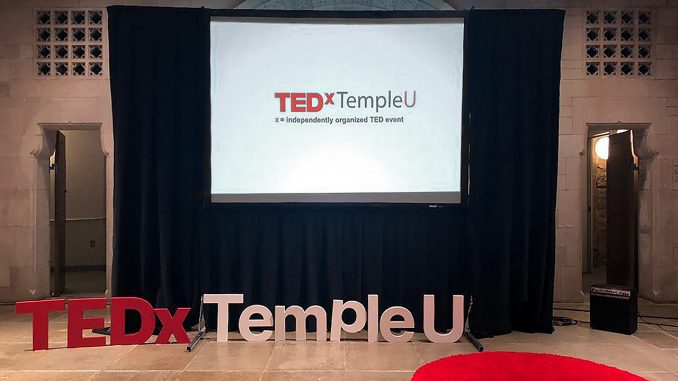
Temple University hosted its third TEDx event on Friday with student, faculty and community speakers, discussing life choices during and after college.
The theme for TEDxTempleU was “XXL,” which stands for Explore, Experience, Live. The event offered a range of speakers who reflected on “how we interact with the lives we choose to live,” according to the TEDxTempleU website. The sold-out event in the Temple Performing Arts Center had ten speakers, including students and alumni.
“It is time that we explore the passions and aspirations,” said Tarahgee Morris, a junior advertising major and organizer of TEDxTempleU, during his remarks. “It is time we experience the little things that might make us happy.”
“Each different part of the theme has a different meaning toward living your best life,” Morris said after the event. “Not even living your best life, but living your life and understanding the context of what you usually don’t interact with in life.”
Temple last hosted a TEDx event in 2013, which featured professors from the College of Science and Technology, said Amanda Chavis, a senior management information systems major and TEDxTempleU’s social media and marketing coordinator. Organizers spent two years planning Friday’s event.
TED, which stands for Technology, Entertainment and Design, is a nonprofit organization that hosts two international conferences each year, welcoming leaders and innovators from different sectors to give 18-minute talks on various topics. TED provides guidance for TEDx events, but TEDx events are independently organized by universities and other institutions that welcome local communities to participate.
One speaker, Mark Gibson, made a 600-mile journey on his skateboard from Washington, D.C. to Ottawa, Canada and ran from Pittsburgh to Philadelphia. Vivian Luke, an author and managing partner for a consulting group, spoke about accepting imperfections.
Forensic chemist Dallas Cherry Jr. advocated to eliminate stigma around medical marijuana use, and senior Africology and African American Studies major Jamal Parker’s talk, “Origin Story,” connected moments in his life to his love for comic books and creative writing.
Leonard Chester, a 2018 advertising alumnus and middle school teacher, spoke about founding the Overcame Foundation, which aims to help underprivileged youth become leaders in Baltimore and Philadelphia. William Lessa, a family therapist, recommended people “look at life like it’s a journey and less like it’s a race.”
“We live in a culture where diversity is challenged everywhere,” said William Careri, a mental health advocate and junior public relations major. “Not just based on the color of your skin, but in terms of your gender sexuality, physical disabilities. …To move past this, we can share our unique experiences.”
The event’s first speaker was Dylan Rhudd, a 2017 marketing alumnus, who talked about “The Art of Graduating” and the transition from college life to adulthood. After securing a full-time job, Rhudd faced challenges balancing his work and social life.
“I found myself constantly thinking, ‘Was nobody going to warn me about this?’” Rhudd said.
Rhudd also offered suggestions about searching for jobs post-graduation, suggesting students focus on networking. He drove for Uber the summer before he graduated and met a passenger who worked for the Navicor Group, a pharmaceutical communications company with a branch in Center City, who asked Rhudd to send in his resume.
“Long story short, my one-year anniversary at the company was this past February,” Rhudd said.
Nicole Owuor, a 2018 cellular and molecular neuroscience alumna, gave a speech titled “Permission to be Flawed,” which introduced and discussed pluralistic ignorance. She described this as when a majority of members in a group privately disagrees with or has a “divergent experience” from the norm, but assumes the rest of the group holds normative views.
To describe the concept, she used the example of a lecture hall, where a professor asks if anyone has questions, but students remain silent.
“You might have questions…but everybody else is quiet, so they must understand and you are not going to be the only one to raise your hand and expose your lack of understanding,” Owuor said during her talk. “But as you file out of that lecture hall, you might hear an undercurrent of rumblings from your classmates saying I have no idea what we covered in class today.”
Pluralistic ignorance comes from people’s fear of vulnerability, criticism and rejection, she said.
“It’s understandable to seek solace in community, but when the need to conform to a group is done so at the expense of your authenticity, it chips away at your self-confidence and it creates a perception of isolation,” Owuor continued.
Samuel Perry, a 2004 journalism, public relations and advertising alumnus, is a high school teacher in Brooklyn, New York, and attended the event because he was invited by his former student, Diamante Ortiz, the director of speaker selection and rehearsal for TEDxTempleU.
Perry found it insightful when junior nursing major Ari Rubinson, a transgender man, talked about necessary changes to the nursing profession, like asking patients for their preferred pronouns.
“Going to my provider as a trans man,…I am almost never asked for my preferred name or my pronouns,” Rubinson said during his talk.
“Assumptions are the barrier to trust,” he added.


Be the first to comment